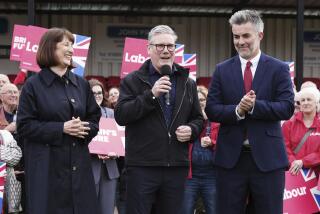Vote Setback Unlikely to Alter Thatcher Policies
- Share via
LONDON — Major losses suffered by Prime Minister Margaret Thatcher’s Conservative Party in nationwide local elections constitute a major psychological setback but are unlikely to have any direct practical impact on her government, political analysts said Friday.
The results of Thursday’s elections, which included the loss of one of two parliamentary seats contested, still leaves Thatcher with a majority of 137 in the 650-seat House of Commons, one of the largest enjoyed by any post-World War II government.
The broader setback of losing 27 of 72 Tory-controlled local government councils is also expected to have little direct influence over her legislative program.
“We must now just keep on with our policies and redouble our efforts,” Thatcher said after a meeting at Conservative Party headquarters here.
However, the psychological fallout of the dismal election performance has already unleashed considerable hand-wringing among the party’s rank and file, worried that Thursday’s poll is the last large-scale electoral test before the next general election. The election must be held prior June, 1988, but many observers expect Thatcher will call it sometime next year.
If the concern persists, it could eventually result in pressure to alter important elements of Thatcher’s domestic policy, such as scrapping plans for more tax cuts and instead, putting the money into controversial areas such as health services and education.
Key Issues
Opinion polls taken just prior to Thursday’s voting indicated that unemployment, education and health services were the key issues.
One Conservative member of Parliament, Julian Crichley, urged more attention to these areas in a radio interview Friday.
“We have to abandon the government target of reducing income tax next year and need more public spending on services, in particular the social services, and we need to get the unemployment figures down,” Crichley said.
A prolonged teachers strike has severely disrupted secondary education in the country, and the government’s hard-line attitude on the issue is widely perceived as reflecting insensitivity.
Tough rhetoric about slashing government spending has also left Thatcher with a major image problem in her health care policies. Although she has increased the national health care budget by 20% in real terms since she became prime minister seven years ago, the public perception is that she has severely cut it and consequently she is blamed long delays and poor service.
Although there was strong public disapproval initially to Thatcher’s decision to permit U.S. warplanes to launch last month’s raid against Libya from British bases, reaction has tempered in recent weeks and few blamed the poor Tory showing on the so-called “Libya factor.” One poll placed it eighth out of eight topics that concerned voters.
Failure to Present Successes
Many Conservative leaders saw the vote mainly as a failure to properly present the government’s successes or to counter Thatcher’s image as an unyielding, uncaring leader who sees high unemployment as a justifiable price for lower inflation and economic growth.
Such criticism has focused attention on the party’s chairman, Norman Tebbit, whose penchant for mud-slinging and political brawling is said to only exaggerate Thatcher’s already tough political image.
“The public has grown tired of it and wants to hear of (the government’s) achievements,” complained Conservative David Crouch.
Tebbit admitted he shared part of the blame for the poor election showing, but flatly ruled out either resignation or any change in style.
“It’s the style that won in 1979 and 1983 and what we’ll win with again,” he said.
Meanwhile, leaders from the main opposition Labor Party and the growing Liberal-Social Democrat Alliance reveled in victory.
“Two thirds of the people of Britain had a chance to vote and the result has been very major advances for the Labor Party,” Labor leader Neil Kinnock said. “It is the strongest evidence so far that we are going to form a majority government at the next general election.”
Liberal leader David Steel called the result “a massive vote of no confidence in the government and a massive vote of confidence in the policies we put forward.”
Liberal-Social Democratic Alliance candidates won one of the two contested parliamentary seats and came within 100 votes of taking the second. Both were considered Tory strongholds.
Labor candidates ran a poor third in both parliamentary elections but swept the local council elections, winning nearly 500 more of the 5,400 seats than they did in similar elections in 1982.
More to Read
Sign up for Essential California
The most important California stories and recommendations in your inbox every morning.
You may occasionally receive promotional content from the Los Angeles Times.













